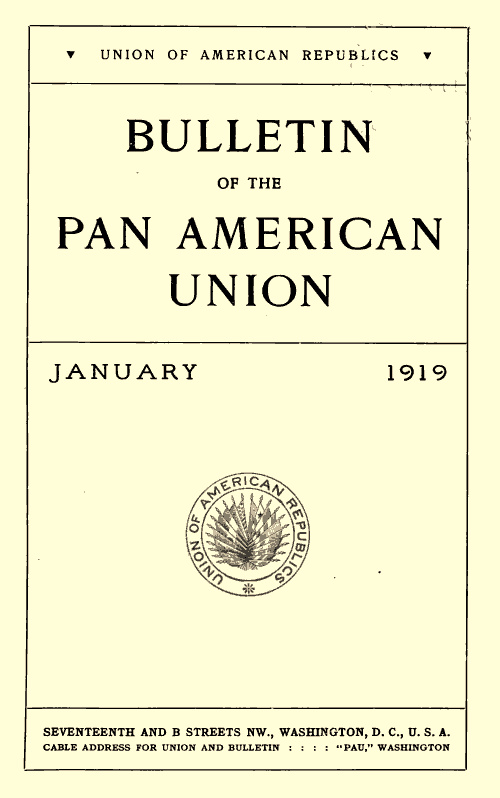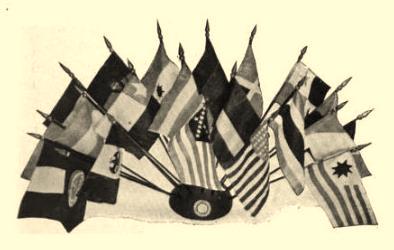|
 |
GENERAL JOSEPH VILLAMIL.1Although in general the services rendered by citizens of the United States to South Americans, in their efforts to free themselves from the yoke of Spain, have been recognized in various publications, it does not appear to be known outside of Ecuador that José Villamil, eminently identified with the movement for freedom, was an American citizen. Of Spanish and French ancestry, he was born in the territory then the Spanish province of Louisiana in the year 1789. When 16 years of age he became first sergeant in the first company of Volunteer Reserves – that is, two years after the territory was purchased from France by the United States in 1803. In 1810, while visiting Cadiz, Spain, he became intimately acquainted with the Spanish-American patriots, Fernando Lorenzo de Velasco, a Mexican, and Manuel de Sarratea, of Buenos Aires, with whom he planned the emancipation of Spanish America. In his "Reseña Histórica" Gen. Villamil says:
Soon afterwards he sailed for Venezuela, arriving at the city of Maracaibo, where he became an enthusiastic revolutionist, with all the dangers and trials attending such a position, at one time being saved execution through the great influence of two of his brothers there and the interest his youth awakened in the governor, Gen. Millares. While passing through Puerto Principe in 1815 Villamil met Bolívar, who ever after retained for him a warm respect and interest, and for whom Villamil felt such esteem that he named his son after the liberator and called one of his daughters Bolivia. During the same year he arrived at Guayaquil, where he was married to the beautiful Senorita Ana Garaicóa and became a permanent resident, his numerous descendants being well known in Ecuador. In February of the following year he descended the Guayaquil River at the time Commodore Brown, from the Navy of Buenos Aires, was at Puna with several war vessels. Villamil returned upstream, not 1 By Dr. Frederic W. Goding, U.S. Consul General at Guayaquil, Ecuador, 24 |
 Photo presented by Sr. Jorje Illingworth I, of Quayaquil
GENERAL JOSEPH VILLAMIL. This leader of independence of Hispanic America was born in 1789 in Louisiana, where he became a sergeant of the first company of riflers shortly after the acquisition of the territory by the United States. He was the leading spirit of the revolution effected in Guayaquil in 1820 against the Spanish régime, and after lending valíant services in the struggle for freedom he remained one of the most noteworthy characters in public life of Ecuador after 1830. |
without being pursued by two of the armed fleet under Brown. In his Reseña Villamil says:
To detain Brown by forcing him to lose the tide was of the first importance. Arriving at Punta de Piedra, which was defended by 6 or 8 cannon and a force of 14 men, Villamil, in the name of the governor, ordered the sergeant in command to send a messenger overland to Guayaquil, and to open fire upon the two vessels. The next day on reaching the city Brown found it strongly defended and he and his vessel were captured. Villamil had occupied a conspicuous part in the preparations for defense, and was later commissioned to treat with Brown as to the final arrangements and exchange of a considerable group of Spanish prisoners captured. About the middle of the year 1820, Villamil figured as the directing genius of the revolutionary movement in Guayaquil. Arranging a ball at his home as a blind, on the night of October 1, the conspirators organized, and on the following night he was commissioned to solicit the aid of the Spanish military forces, in which project he was successful. At his house a week later, at the dinner celebrating his appointment as attorney general by the Royal Government, every patriot involved was given special instructions; and on October 20, 1820, the blow was struck which forever ended Spanish rule in Guayaquil. Two days later Villamil started on his mission to inform Lord Cochrane and Gen. San Martín of the result of the uprising. After receiving the greatest attention from these gentlemen he returned to Guayaquil accompanied by delegates to the independent government of the province, and was commissioned lieutenant colonel by Gen. San Martín. In command of a squadron of cavalry, Villamil took an active part in the defeat of the Spanish troops at Huache and other battles, later serving under the gallant Gen. Sucre until the final surrender of the royal troops. In 1830 Villamil declared the Galapagos Islands an integral part of the Republic of Ecuador, the Government concurring and taking formal possession of the archipelago February 12, 1832. Having received a grant of Floreana Island, one of the group, he estab- |
lished thereon a colony, and devoted most of his remaining years and fortune to the development of the island, placing live stock and agricultural implements within reach of the settlers. As a military man Villamil was upon various occasions chief of the military forces of the department of Guayas, chief of staff and operations and division general, the highest rank in the army register of Ecuador. In civil life he was mayor of Guayaquil, department prefect, and collector of customs at Manabi. In 1852 Gen. Urbina, the supreme chief of the Republic, called him to his cabinet as minister of war; and after the reorganization of the Government he was sent as chargé d'affaires to the United States. After serving for several years in public affairs he retired to private life; but, although weighted with years, he offered his services to the Chilean Government on learning that the Spanish squadron was bombarding Valparaiso. Gen. Villamil, of whom all Americans as well as Ecuadorians may well feel proud, died at Guayaquil, where his remains are buried, May 12, 1866, at the age of 77. His name occupies a prominent place in the history of Ecuador, being revered as that of one of the country's greatest patriots.  |
|
Source.
Dr. Frederic W. Goding.
This transcription was made from the volume available at Google Books.
Last updated by Tom Tyler, Denver, CO, USA, December 28, 2024.
|
|